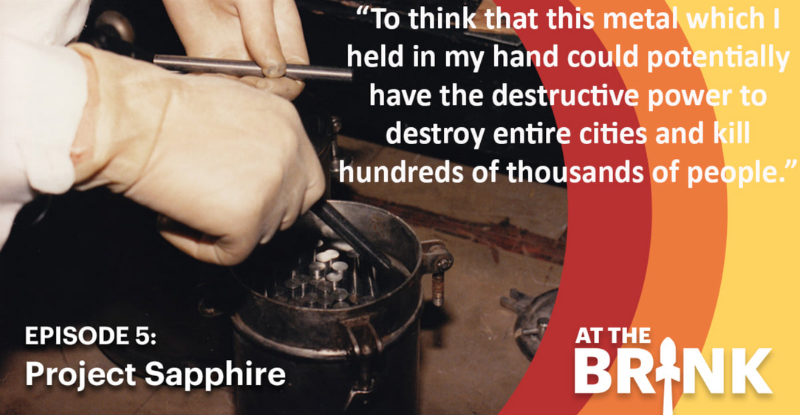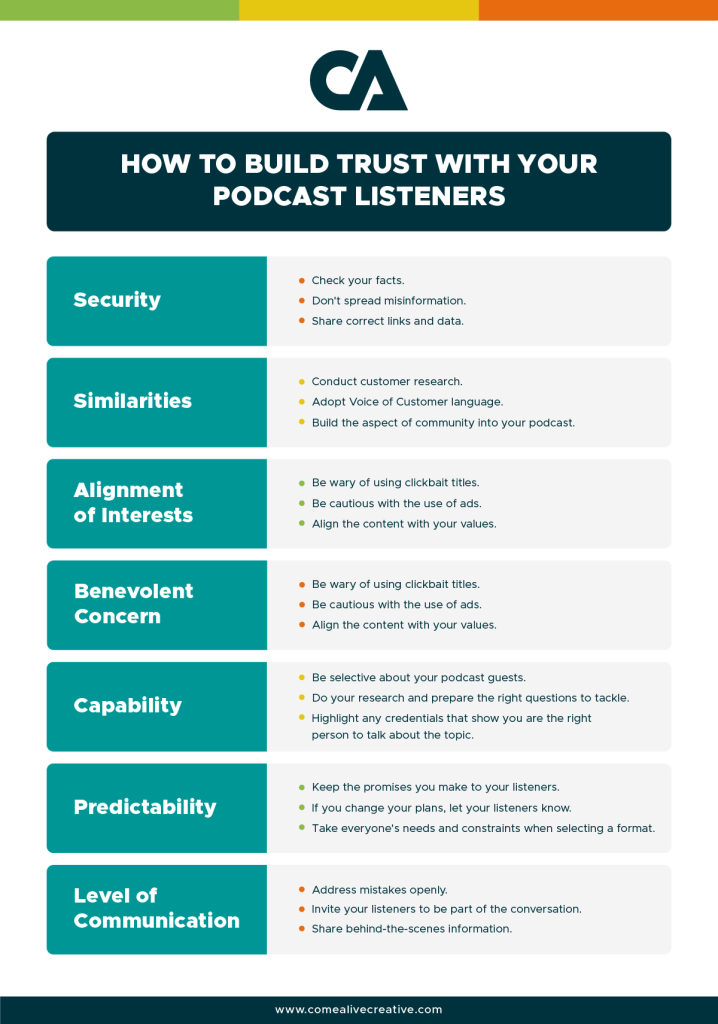In a world where trust is the most valuable currency for business, podcasts are the unsung heroes, providing the perfect opportunity to build authentic and intimate connections.
And it seems easy. Just publish a podcast, and trust will be built, right?
In reality, using podcasts to build trust requires planning and intentionality. In this article, I share seven key factors for building trust and how they apply to podcasting.
7 Factors for building trust.
In the Harvard Business Review article “Decision to Trust,” Robert F. Hurley outlines seven situational factors that people evaluate when deciding whether to trust or not.
Once you understand these seven factors, you can use them in any business area to help you build the right connections. And when it comes to podcasting, you can use them to maximize the trust you build with your audience and potential customers, ultimately leading to business growth.
Factor 1: Security.
Security isn’t necessarily something that you think of in relation to podcasts, but it definitely ranks high when it comes to trust. And when people are trying to decide whether they should trust a product, person, or company, they try to measure the associated risk. The lower the risk is, the easier it is to trust.
And while there aren’t many obvious risks associated with listening to podcasts, one stands out: the risk of misinformation. In fact, Podcast Taxonomy lists fact-checker as one of the recognized roles in podcasting because it is so important.
When preparing for an episode, make sure you do thorough research into the subject and pull relevant data. This shows the listener that you’re well-informed on the topic.
If you want to make your podcast a safe space for listeners, you have to make your podcast credible by conducting thorough research and pulling relevant data. This means checking your facts, making sure you share correct links, and using data from trusted sources.
Practical tips:
- Check your facts.
- Don’t spread misinformation.
- Share correct links and data.
Factor 2: Similarities.
We humans are social creatures, and we tend to trust other humans that are similar to us.
Similarities can include values, belonging to the same group, personality traits, and even the way we communicate.
If you want your podcast to be relatable, you’ll have to research your customer.
By understanding your audience’s needs, preferences, challenges, and goals, you can tailor the content accordingly. A great way to do this is by applying voice of customer methodologies to truly understand what topics they care about.
For example, you can use an audience research tool like SparkToro to learn about your target audience. This type of research can provide you with data on content your audience watches, listens to, and reads. And with this information, you can tailor your own content to their interest and even select the right partners for sponsorship deals.
As your similarities become evident, your audience realizes you align with their vision and trust blooms.
Practical tips:
- Conduct customer research.
- Use Voice of Customer methodologies.
- Build the aspect of community into your podcast.
Factor 3: Alignment of interests.
Imagine you visit your doctor’s office, hoping they will help you get through a bout of flu. But throughout the consultation, you realize that they are more interested in selling you their line of flu medicine than actually improving your health. Your trust shatters.
This can happen in any scenario where interests don’t align.
When a person listens to a podcast, they are generally looking for education, entertainment, or both. Every one of your listeners has expectations about your podcast, expectations they’ve built based on the episode title, show notes, reviews, etc. If they feel, at any point, that your interests are not aligned with their expectations, they will simply jump off your podcast.
If you want to build trust, you need to focus on your audience and deliver the value they expect.
Practical tips:
- Ask yourself what your audience needs help with.
- Focus on the solutions you can provide for your audience.
- Request feedback periodically.
Factor 4: Benevolent concern.
We tend to believe people are self-centered. It’s just human nature. And nothing erodes trust as much as someone who is trying to manipulate you.
This can happen in podcasting when you put your business’ priorities before your audience’s. If you try to push too much on sales during any cast, or if you use clickbait titles to increase plays, you will come off as self-interested instead of benevolent.
This doesn’t mean you can’t use your podcast for sales. In fact, when done right, podcasts are a great sales tool. You just need to strike the right balance between sales content and valuable content.
Imagine you subscribe to a new podcast about local entrepreneurs in your city. But once you start listening to the podcast, the host starts promoting mass-produced goods through host-read ads. It will feel like they don’t really care about the topic they are covering in the podcast and they just care about making more money.
The more you align your content, especially sponsored content, with your values, the more trust you can gain.
Practical tips:
- Be wary of using clickbait titles.
- Be cautious with the use of ads.
- Align the content with your values.
Factor 5: Capability.
A listener won’t trust a brand that has not demonstrated a consistent ability to meet his or her needs. And if you can’t establish your podcast’s credibility, they will believe you are incompetent.
Establishing capability means establishing credibility. And while this factor is closely related to factor 1, safety, it goes beyond sharing accurate information.
One of the best ways of establishing credibility is by choosing the right topics, asking the right questions, and finding the perfect podcast guests. You might even want to outsource your podcast interviews to make sure you build your reputation and credibility in the best way possible.
For example, when we worked on the At the Brink podcast, we were covering stories about the threat of nuclear weapons. Guests included historians, congressmen, and even the 42nd President of the United States. If we hadn’t been able to find the right experts to interview as guests, the podcast wouldn’t have been successful.
Practical tips:
- Be selective about your podcast guests.
- Do your research and prepare the right questions to tackle.
- Highlight any credentials that show you are the right person to talk about the topic.

Factor 6: Predictability.
Consistency and predictability are crucial when it comes to podcasting—and digital content creation in general.
If you tell your listeners that you will be publishing new episodes every day, but the workload becomes too much to handle, and you become inconsistent, your listeners will feel like they can’t trust you.
Similarly, if you promote your podcast as a series of one-on-one conversations and interviews and then decide to switch to monologues and storytelling, listeners will feel apprehensive about the change.
When thinking about predictability for your show, you first need to think about the goal. If you want broad appeal and reach, you can try a narrative podcast or another creative format. If you want to build intimate relationships, then one-to-one interviews are a better choice.
And when it comes to length and periodicity, you need to consider the needs of your business, the host, and the audience. If the host and guests have limited time, you’re better off with a shorter show. And if the production process is complex and requires a lot of planning, you might want to consider weekly episodes instead of daily ones.
What matters the most is that you select a format that helps you meet your needs and constraints.
Practical tips:
- Keep the promises you make to your listeners.
- If you change your plans, let your listeners know.
- Take everyone’s needs and constraints when selecting a format.
Factor 7: Level of communication.
Finally, trust is about building relationships, and building relationships depends on communication. And if you have communication failures, you and your podcast will be viewed with suspicion.
You might shy away from being overly informal with your podcast, but communicating with authenticity and transparency is needed if you want to build trustful relationships with your listeners.
A podcast is the perfect place for you to be honest about your strengths, weaknesses, opportunities, and challenges, and share your insights, opinions, and experiences. Don’t be afraid to admit your mistakes, ask for feedback, and invite listeners into the conversation.
Discussing these insider nuts and bolts may seem like you’re revealing too much. You are. But that’s what podcasting is all about. It’s storytelling at its finest.
Practical tips:
- Address mistakes openly.
- Invite your listeners to be part of the conversation.
- Share behind-the-scenes information.

Turn your podcast into an inner circle.
Podcasting creates a portal where your listeners are invited into your inner circle.
Within this inner circle, you are able to build relationships and trust in a way that is impossible through billboards or TV commercials. You can reveal the personality and soul of your business by giving a voice to the people who make up your company.
Think about it. When people listen to podcasts, they’re looking for the human voices and stories. According to Insider Intelligence, the number of podcast listeners will continue to increase beyond 2025. So, more and more people are turning to podcasts to find the brands they can trust.
Now you can see why podcasting is quickly becoming one of the best platforms for brands to connect with their audience. And yet, not all brands are taking full advantage of podcasting’s unfair advantage.
If you haven’t invested in this medium yet, and you’re curious about how it can help your company build trust, reach out to our team. We can help you figure out the best podcasting strategy for your business.


